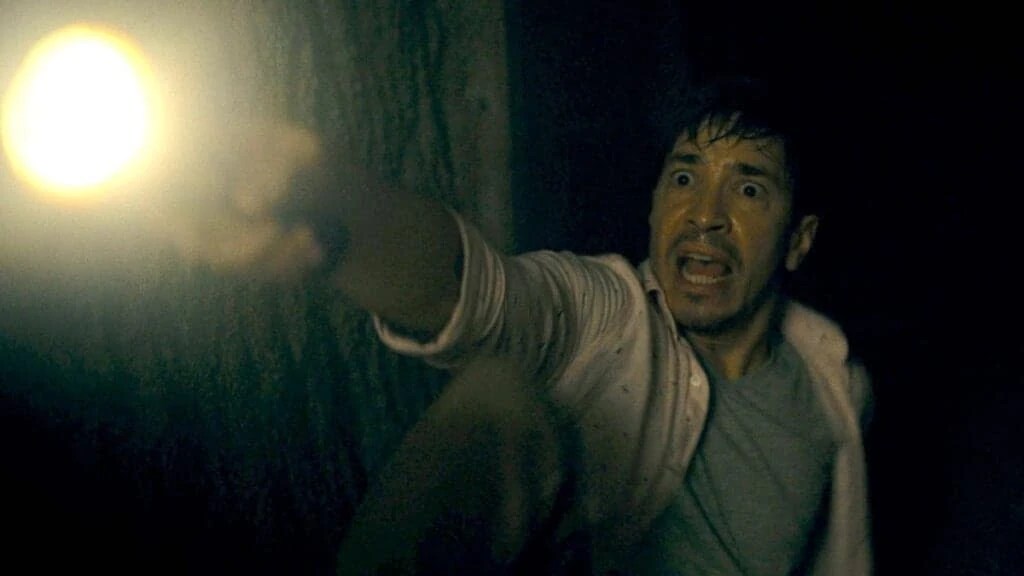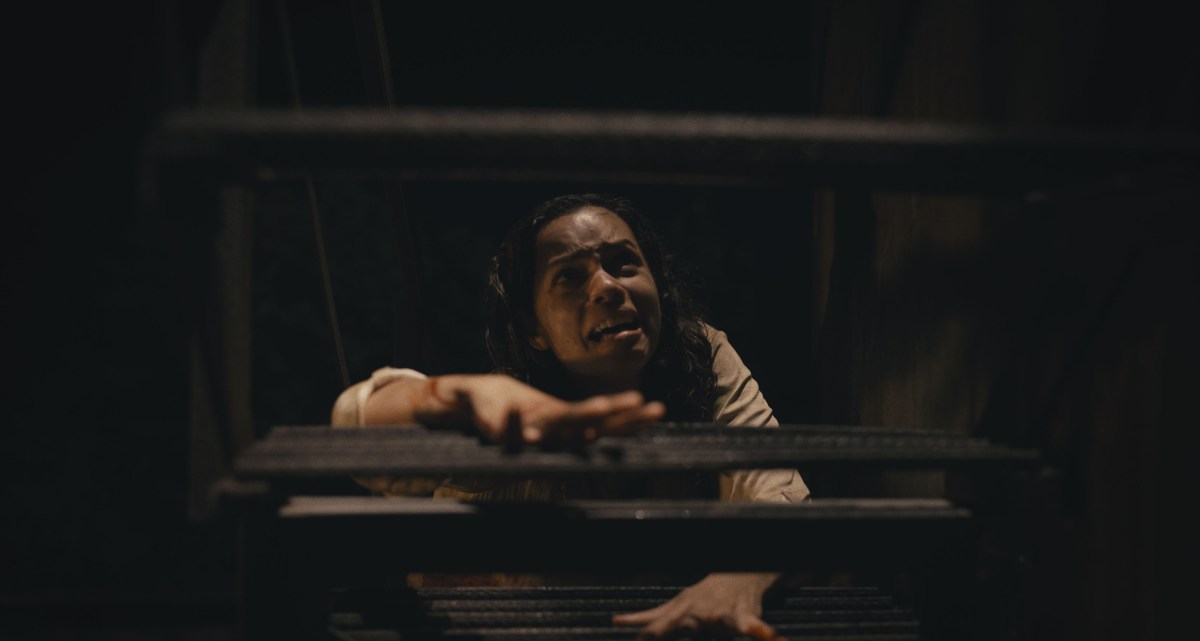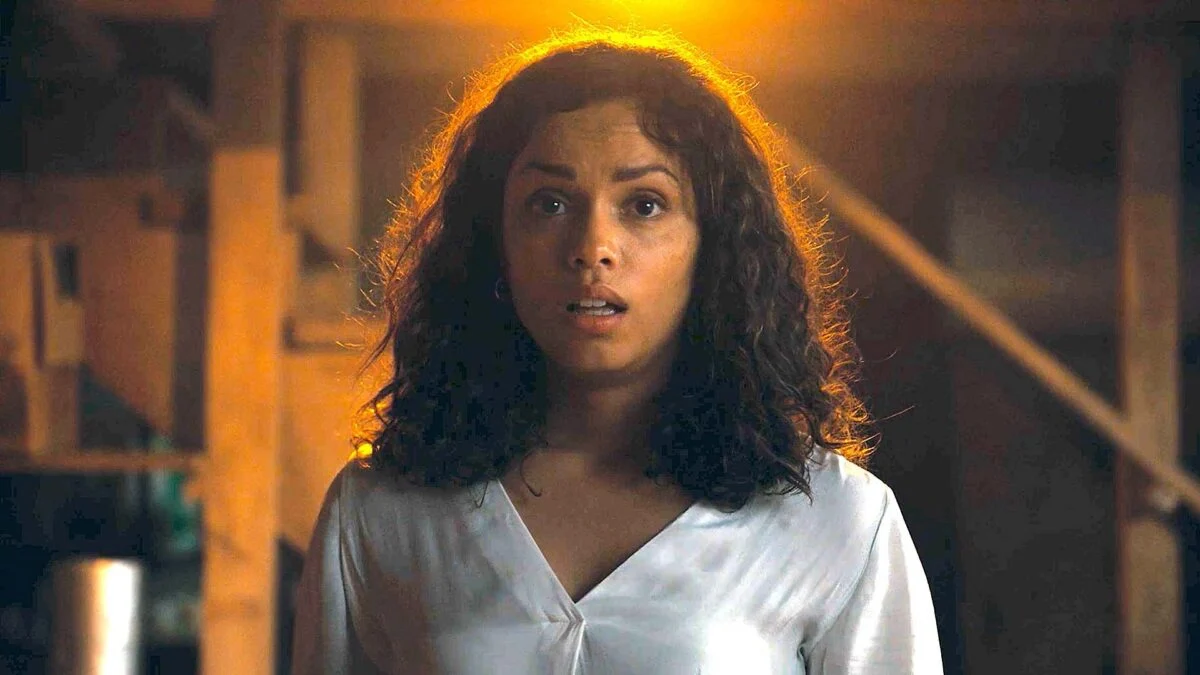Zach Cregger’s darkly funny horror movie Barbarian, about an unspeakable evil lurking in a Detroit Airbnb, is full of twists and surprises. But the best twist has nothing to do with the film’s monster—and it makes a powerful statement about gendered violence.
Trigger warning: this post contains references to rape and gendered violence.
This post also contains major spoilers for Barbarian.
The film centers on Tess (Georgina Campbell), who goes to Detroit for a job interview and finds that her Airbnb has already been booked by a man named Keith (Bill Skarsgård). The accidental housemates soon find that there’s something lurking in the basement. It turns out the house used to belong to a man named Frank (Richard Brake), who spent decades kidnapping, raping, and murdering dozens of women in a dungeon under the house. Frank impregnated the women and raped their children, too, and his experiment eventually resulted in a monstrously strong woman the film only calls “the Mother” (Matthew Patrick Davis). The Mother’s goal is to be a mother, since she’s grown up watching an old breastfeeding video on repeat, and after killing Keith, she locks Tess in a cage and bottle feeds her.
Enter A.J.

The second act of the movie abruptly jumps to A.J., an actor in Los Angeles whose career collapses after a colleague accuses him of rape. Selling his house to pay for the legal fees, A.J. goes to another property he owns in Detroit—which just happens to be the very Airbnb where Tess is drinking from filthy baby bottles in an underground cage. When A.J. finds the dungeon, he begins measuring the square footage so he can get more money for the house (this scene is, incidentally, the funniest and most stressful part of the whole film), and the Mother wastes no time in capturing him.
A.J. and Frank are both rapists, but the movie is careful to set up a stark contrast between them. Before going into the dungeon, A.J. visits an old friend at a Detroit bar, where he drunkenly admits that his colleague didn’t want to have sex with him until he made her. He either can’t or won’t admit that what he’s describing is obviously rape, but later, he’s horrified when he finds a collection of VHS tapes on which Frank recorded himself raping and torturing his victims. Does he see himself in Frank’s actions? Or is whatever is happening on the TV screen (it’s hidden from the audience, so we only get A.J.’s reaction) so disgusting that even a dirtbag like A.J. can see that it’s wrong? Either way, the moment sets the stage for A.J.’s redemption.
That redemption seems to happen while Tess and A.J. are hiding from the Mother in a vacant lot with Andre (Jaymes Butler), a local resident who has rushed them to safety. During their panicked escape, A.J. accidentally shot Tess with Frank’s gun, and now he’s trying to figure out how to get her to a hospital. As he’s blubbering about his guilt over injuring Tess, A.J. starts to make some startling confessions. “Maybe I’m a bad person,” he says. “Maybe I’m a good person, but I did a bad thing.” He says he’s going to fix his mistake, and we realize that he’s not just talking about Tess’s gunshot wound—he’s finally coming to terms with the fact that he raped someone, and he needs to atone for it.
At first, this moment is actually kind of disappointing. You mean to say we followed Tess through that whole first act, only to have the movie suddenly turn into a rapist’s sappy redemption story? This film seemed to be an allegory for gendered violence, but now it’s asking us to forget the female lead and focus our emotional energy on an awful guy who’s finally acting human? For real?
Except that’s not what the film is doing at all.
Surprise, surprise: A.J. still sucks
A.J.’s has barely finished his speech when Barbarian turns his redemption arc on its head.
As they’re talking, the Mother bursts in through a wall, rips Andre apart, and sends Tess and A.J. scrambling up the stairs of a water tower to get away. At the top, though, they realize there’s nowhere to run.
But A.J. hastily comes up with a plan. He grabs Tess and throws her over the side of the tower, trusting that the Mother will go after her and give him time to escape. A.J. proves that he’s learned absolutely nothing. There’s no self-reflection here, no will to do better. To A.J., women just don’t matter, even if he tries to convince himself otherwise.
Miraculously (or improbably), Tess survives when the Mother jumps after her, reaches the ground before her, and cushions her fall. A.J. switches back into hero mode and helps Tess up, but by now we know his efforts are nothing but shallow posturing, and he’ll abandon Tess again the moment it suits him. Luckily, he never gets the chance. As the two are limping away, the Mother wakes up, gouges A.J.’s eyes out, and crushes his skull.
The heart of violence

Barbarian flips the script on A.J’s misogyny in other ways, too. While the Mother is holding him captive, for instance, she tries to nurse him, forcing her nipple into his mouth so that he feels the same violation that he’s inflicted on his colleague (and likely other women, as well). It’s very much a teachable moment for A.J., and it’s a shame he doesn’t understand the lesson.
At its core, Barbarian is more than just a horror movie—it’s a dark exploration of the ways that gendered violence perpetuates and endures. The Mother, although her story is deeply tragic, is the demon lurking in the psyches of rapists like A.J. and Frank, and it’s fitting that she also serves as their comeuppance.
And what about Tess, who’s failed by almost every single man she meets in the film? In the end, after she shoots the Mother and hobbles away from the body, we’re faced with a grim and infuriating truth at the heart of violence: often, there’s no atonement or closure. There’s only survival.
(Featured image: 20th Century Studios)










Published: Sep 30, 2022 02:54 pm